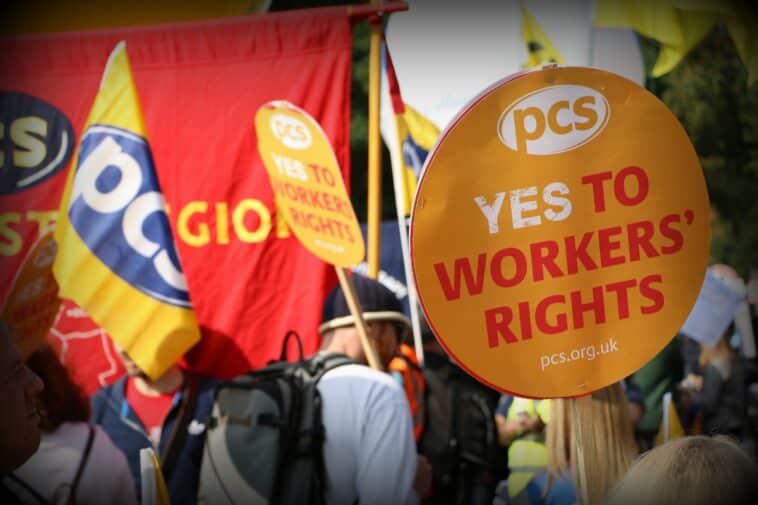

By a PCS member
WITHOUT WARNING, let alone consultation, Boris Johnson has announced over 90,000 job cuts in the civil service. To add insult to injury he did so through the pages of the virulently anti-worker Daily Mail, while suggesting the resultant savings would be used to cut taxes, benefiting the rich most.
One in five jobs are to go, and while some cuts will be achieved by terminating temporary contracts or deleting vacancies, these are still job cuts that will devastate families during the crisis.Those who remain at work will doubtless be expected to do 20% more work for no extra money. If you think backlogs at the Passport Offices, Job Centres and DVLA are bad now, worse is to come.
Conference
PCS, the main civil service union, held its annual conference shortly after the announcement. Conference was already set to vote on balloting members over pay and pensions.
The government has offered only 2% on pay, while inflation is running at 10%. It is also forcing staff to make overpayments of hundreds of pounds per year to their pension fund. Delegates simply added job cuts and the unilateral ripping up of redundancy terms to their list of grievances.
The union will ballot members for industrial action from 1 September. This decision was hotly debated, with a competing motion proposing that the ballot begins earlier, on the 1 July, and that it be ‘disaggregated’.
The NEC argued that balloting later increases the chances of joint action with other public sector unions. Of course this would be far better than fighting alone, but the pension strikes of 2011 ended in disaster because the more moderate unions peeled off after the first strike day.
Also there is no guarantee that the other unions will join in. Unison’s local government ballot in January achieved a measly 14.5% turnout and NHS unions failed to even ballot. Hopefully a civil service strike will reinvigorate health workers, council staff and teachers, but PCS must be willing to take action alone.
Delegates were also persuaded by the NEC’s argument that the union needed more time to organise for a ballot because an indicative ballot in March only achieved a 45% turnout, below the 50% threshold for a statutory ballot. Furthermore, members were allowed to vote online or by phone in March; they won’t be permitted to do so in the official ballot.
Organisation
However, the National Executive has failed to use the intervening two months to set out and implement an organising strategy to increase members’ participation. Such a plan should include a recruitment drive, cleaning up membership data, workplace meetings and electing strike committees—and it is urgently needed now.
Indeed the job cuts announcement has sent a shockwave through the ranks of government workers, with huge numbers attending union meetings to discuss the threat and a surge in recruitment. To get over the threshold, the union must capitalise on this and focus on rebuilding the roots of the union—the local branches.
Even so, not all departments will reach the beginning of September equally ready to get the vote out. The danger of some departments not hitting the threshold may stop the whole union from taking strike action. This is why some delegates voted to disaggregate the ballot, allowing the better organised departments to strike together.
Though that vote lost, the NEC motion did not rule out disaggregation. The union’s leadership has historically opposed the tactic, however the university lecturers (UCU) and rail workers (RMT) have recently split ballots and started strikes where they can, while those who narrowly failed to reach the threshold are reballoted, with ongoing strikes acting as an incentive.
What kind of action
Finally it is worth using the build up to start a discussion about what kind of industrial action is capable of forcing concessions from the government. In the past the PCS has used one-day strikes but these have failed to deliver real gains.
We need to sharply escalate the action from one-day to one-week to all out indefinite strikes. This has produced significant successes in the private sector and can do so in the civil service too. The precondition for this is an active membership, stimulated by a rank and file movement which fights for control of the dispute. That tradition has been absent for far too long in white-collar unions, but can be built with lightning speed in the current period of crisis—so long as socialists intervene to raise workers’ horizons and put forward a fighting strategy for collective discussion and action.